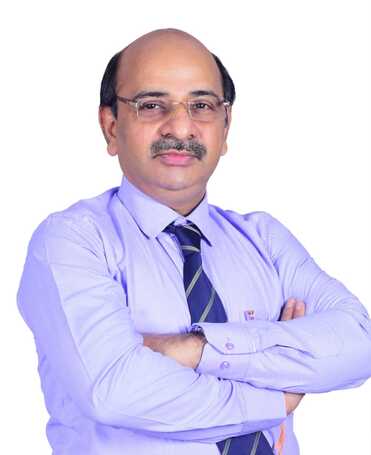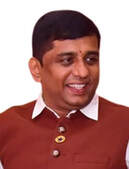|
Mr. Santhosh Rao is a strong HR leader having more than 25 years of rich experience as an HR Generalist in manufacturing sectors with a thorough exposure to global HR practices in fortune 100 companies. He is currently working as Associate Vice President with Toyota Industries Engine India and is responsible for HR, IR, Admin, and EHS functions. Mr. Rao is a Post Graduate in Social Work with a specialization in Personnel Management from the School of Social Work, Mangalore. He has rich work experience of working with Indian Corporates and MNCs like Grasim, PepsiCo, and Toyota Kirloskar Auto Parts. Mr. Rao is a certified Master Trainer in many global contents of the Toyota Training System. Has played a key role in strategy development, execution of resolving IR turbulence, and concluding about 12 wage negotiations so far. He is passionate about "Campus –Connect" programs to improve Industry-Academia interaction in B schools and technical institutions and youth development activities. He has been actively mentoring many young HR professionals and HR students. “Ordinary employees are those who consider ordinary achievements as extraordinary and feel satisfied. 1. What is it that makes you passionate about HR? Really, I wasn't keen on making HR my profession. It's my luck, I'm in HR today. HR is a that profession, which is people-centered and development-focused. In the process of developing people, HR contributes good citizens to society. Employee development means, good employee, good son/daughter, good partner, good friend, good human being, etc. 2. What is your success mantra? I strongly believe that “the road to success is always under construction.” So far, I feel like I haven't done much. However, I believe the following are the mantras of success:
3. What values, the future HR must have it? HR is a collaborative function dedicated to valuing, encouraging, supporting, developing, counselling, motivating, inspiring the diversified manpower to deliver their best without any bias. HR must have values, which will empower employees to become champions of their personal and professional lives. 4. How to get business leaders to value their HR leaders? Business leaders like those who add value to the business and increase numbers. It is their responsibility and they are accountable for this. HR leaders need to understand this pulse and build the HR department with a business-centric approach, proactive value-added strategies, ensuring greater productivity from employees, cost-effective HR strategies to manage business uncertainties in line with applicable rules and regulations. 5. The best advice you gave to your team during Pandemic. COVID-19 distinguished employees from their workplaces and colleagues for the first time in this century. As part of this additional stress, fear of job loss, drop in self-motivation and morale, health and family problems, fear of COVID infection, media stress, and so on. It was real-time for HR to showcase their real HR skills and human-centric approach. During this period, I have given the following tips to my team:
6. What is your ideal company? My ideal company is a company that does not allow me to go into my comfort zone. 7. What is your stress management mantra? Stress can't be avoided but I think the main thing is how we handle chronic stress. As Mr. Shiv Khera says, stress is nothing but the price we pay to win. I believe in facing the problems as they come, accepting things as they are with a strong belief that all problems are going to be short-lived. I consider each problem as a challenge and an opportunity to reflect and improve. With good reflection, we will do everything to prevent a recurrence, which reduces future stress. 8. Do you think Artificial Intelligence will be a challenge for HR? AI is not a problem for HR, it is an opportunity for HR. AI simplifies operational HR functions and offers extra time to work on innovative interventions to enhance the internal and external experience of customers. AI facilitates human resources to emerge as a strong profit center rather than a cost center. 9. The mistakes, HR should not do it…
10. Do you think the present skills of HR professionals will be outdated in the next few years? HR's current operational skills may get outdated but human-centric skills will become increasingly necessary and critical. Additionally, HR professionals should focus on people and data analysis, digital HR, business, branding and HR marketing, Gen Z management, planning, and change management, young leadership management, and so on. 11. What is the current biggest lacuna in HR? We must admit that young HR professionals prefer comfortable assignments than challenging assignments. This attitude of HR professionals does not allow them to explore better opportunities in the field of industrial relations. Over the next few years, HR will have a shortage of IR experts. It's time, senior IR stalwarts come forward and inspire young HR professionals to pursue careers in IR. 12. How do you distinguish “Ordinary and Extraordinary” employees? Ordinary employees are those who consider ordinary achievements as extraordinary and feel satisfied. Extraordinary employees consider extraordinary achievements as normal and feel an appetite for achievements.
0 Comments
Leave a Reply. |
ArchivesCategories
All
|
||||||
SITE MAP
SiteTRAININGJOB |
HR SERVICESOTHER SERVICESnIRATHANKA CITIZENS CONNECT |
NIRATHANKAPOSHOUR OTHER WEBSITESSubscribe |
MHR LEARNING ACADEMY
50,000 HR AND SOCIAL WORK PROFESSIONALS ARE CONNECTED THROUGH OUR NIRATHANKA HR GROUPS.
YOU CAN ALSO JOIN AND PARTICIPATE IN OUR GROUP DISCUSSIONS.
YOU CAN ALSO JOIN AND PARTICIPATE IN OUR GROUP DISCUSSIONS.
|
|



 RSS Feed
RSS Feed





